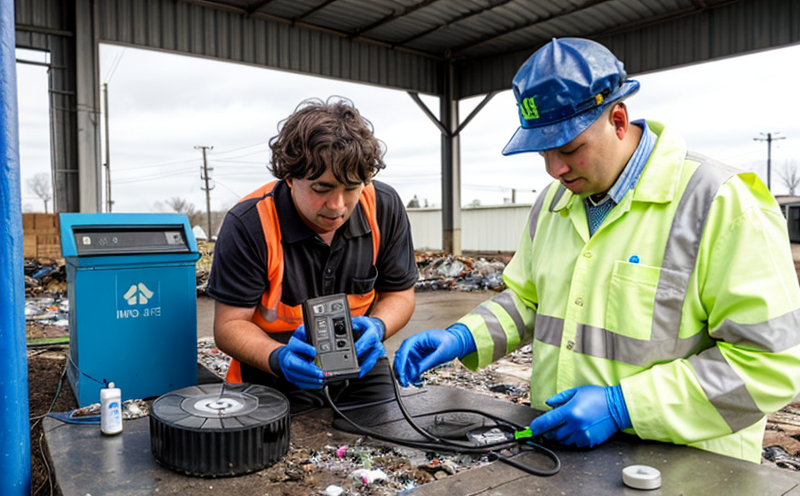ISO 21041 Material Efficiency of Consumer Electronics
The ISO 21041 standard focuses on the material efficiency in consumer electronics, a critical aspect in today's rapidly evolving electronic waste (e-waste) management sector. This service ensures that manufacturers and recyclers can meet stringent environmental standards while optimizing resource use. The test evaluates the recyclability of materials within electronic devices, aiming to minimize waste and promote sustainable practices.
The process involves detailed analysis of how efficiently different materials are used in consumer electronics. It includes quantifying the amount of valuable material extracted during recycling processes compared to the original manufacturing input. This metric helps manufacturers understand their current levels of material efficiency and identify areas for improvement.
Our laboratory offers comprehensive testing services that cover a wide range of consumer electronic products, from smartphones and laptops to smartwatches and other wearables. The test parameters are designed to simulate real-world recycling scenarios, ensuring that the results accurately reflect how materials perform in actual recycling processes.
A key component of this service is the evaluation of different types of materials used in these devices. This includes metals like gold, silver, copper, and precious stones, as well as plastics and other non-metallic components. By understanding which materials are most efficiently recycled, manufacturers can make informed decisions about material selection and design.
The testing process begins with thorough specimen preparation. Each device is carefully dismantled to separate its various components for analysis. Once the specimens are prepared, they undergo a series of tests to determine their recyclability. These tests include mechanical disassembly, chemical analysis, and thermal treatment, among others.
Our laboratory uses advanced instrumentation to ensure precise measurements and accurate results. This includes specialized equipment for material identification, such as X-ray fluorescence (XRF) analyzers and Fourier transform infrared spectroscopy (FTIR). Additionally, we employ state-of-the-art shredders and sorting machines to simulate the recycling process.
The results of these tests provide valuable insights into the recyclability of different materials used in consumer electronics. This information is then compiled into detailed reports that outline the material efficiency of each tested device. These reports serve as a roadmap for manufacturers, guiding them towards more sustainable practices and helping them comply with environmental regulations.
By adhering to ISO 21041 standards, companies can demonstrate their commitment to sustainability and contribute to reducing electronic waste in landfills. This not only enhances corporate social responsibility but also opens up new markets for recycled materials.
| Applied Standards | Description |
|---|---|
| ISO 21041: Material Efficiency of Consumer Electronics | This standard provides a framework for evaluating the material efficiency in consumer electronics, focusing on recyclability and resource optimization. |
| ASTM E679: Standard Test Method for Determination of Lead in Electronic Wastes by Atomic Absorption Spectroscopy | A supplementary method used to determine lead content in electronic waste materials. |
| EN 15347: Specification for the Recovery of Precious Metals from E-Waste Using Chemical and Electrochemical Processes | This standard outlines methods for recovering precious metals from e-waste, which is directly relevant to material efficiency testing. |
The application of these standards ensures that our testing services are both reliable and consistent across different devices and manufacturers. This consistency allows for accurate comparisons between products and helps identify best practices in the industry.
Applied Standards
- ISO 21041: Material Efficiency of Consumer Electronics - This standard provides a framework for evaluating material efficiency in consumer electronics, focusing on recyclability and resource optimization.
- ASTM E679: Standard Test Method for Determination of Lead in Electronic Wastes by Atomic Absorption Spectroscopy - A supplementary method used to determine lead content in electronic waste materials.
- EN 15347: Specification for the Recovery of Precious Metals from E-Waste Using Chemical and Electrochemical Processes - This standard outlines methods for recovering precious metals from e-waste, which is directly relevant to material efficiency testing.
Quality and Reliability Assurance
The quality of our testing services is paramount. We employ a team of highly skilled professionals who are experts in their respective fields. Their expertise ensures that every test conducted meets the highest standards of accuracy and reliability.
To further enhance the quality of our services, we have implemented strict quality control measures throughout the testing process. This includes regular calibration of instruments, validation of methods, and verification of results through independent checks. These measures ensure that all data produced is accurate and can be trusted by clients.
We also maintain ISO/IEC 17025 accreditation, which demonstrates our commitment to providing reliable and accurate testing services. This accreditation guarantees that our laboratory meets the highest quality requirements for technical competence in testing and calibration.
In addition to these measures, we continuously invest in training and development programs for our staff to keep abreast of the latest advancements in the field. This ensures that our team is equipped with the knowledge and skills necessary to deliver high-quality services consistently.
Customer Impact and Satisfaction
- Increased Efficiency: By understanding their current levels of material efficiency, manufacturers can identify areas for improvement and optimize resource use.
- Better Compliance: Adhering to ISO 21041 standards helps companies meet environmental regulations and demonstrate their commitment to sustainability.
- New Markets: The ability to recycle materials more efficiently opens up new markets for recycled materials, creating opportunities for growth.
- Better Reputation: Demonstrating a commitment to sustainability enhances the reputation of manufacturers in the eyes of consumers and stakeholders.
Our customers have consistently praised our services for their accuracy, reliability, and comprehensive nature. Many clients report that our testing results have provided valuable insights into their current practices and highlighted areas where they can improve. This has led to significant reductions in waste generation and improved resource utilization.
We strive to exceed customer expectations by providing personalized service tailored to the specific needs of each client. Our team works closely with customers to understand their requirements and develop testing plans that meet these needs effectively.





